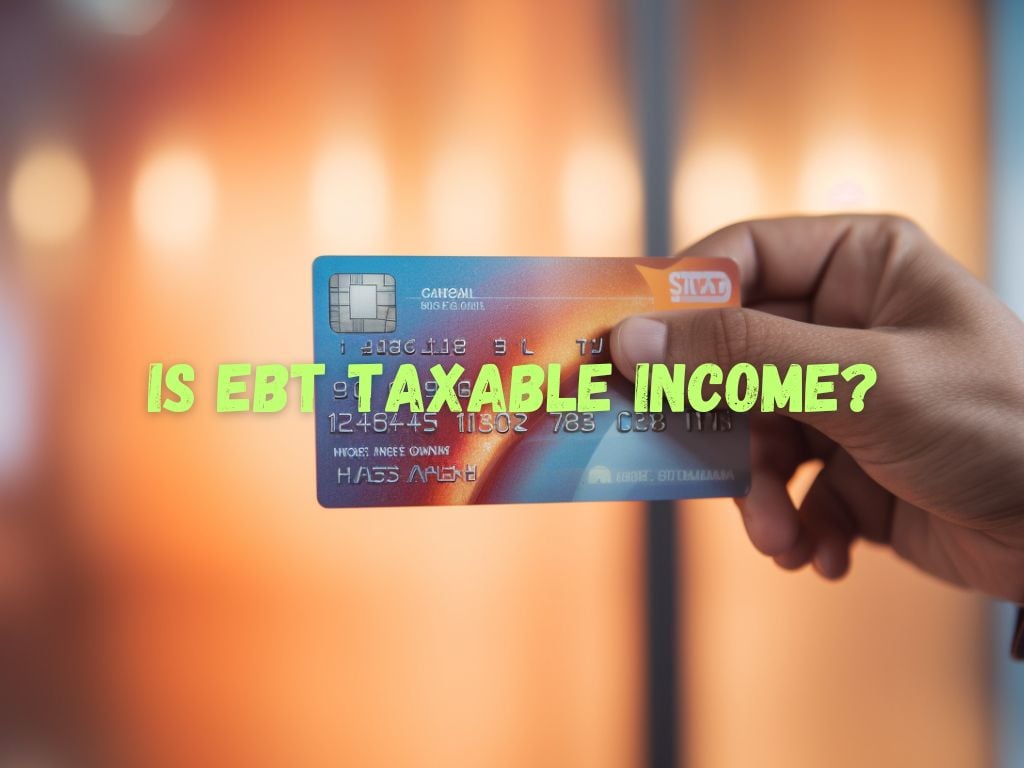Electronic Benefits Transfer, known as EBT, plays a vital role in society. EBT is a system providing assistance to individuals facing hardship, allowing them to meet their most basic needs.
It’s a helping hand to those who have fallen on hard times, supplementing their income and providing stability.
But within this context, a question often arises: “Is EBT taxable income?”
Today, we’ll seek to answer this crucial question and discuss the tax implications of EBT.
Understanding Taxable Income
When we navigate through the maze of anything tax-related, the term ‘taxable income’ often crops up.
Let’s establish a clear understanding of what it entails. Taxable income is, in essence, the portion of your overall income that is subject to tax.
This typically includes wages from a job, profits from a business, and, sometimes, funds from various forms of public assistance.
However, it’s important to note that the taxability of income isn’t a blanket rule applied uniformly.

Taxable Vs. Non-Taxable: Drawing the Line
For every rule, there’s an exception, and the concept of taxable income is no different. It’s important to note that not all you earn or receive is taxable.
The IRS has clear-cut guidelines distinguishing taxable income from non-taxable income.
For instance, certain types of public benefits, gifts, and inheritances aren’t usually subject to federal income tax.
Conversely, wage income, freelance income, and any business revenue are classified as taxable. Understanding these distinctions is key to calculating your taxes accurately.
Is EBT Taxable Income? The Tax Situation
Now let’s look at EBT. It is a system that delivers benefits to individuals. It assists them with needs such as food and cash aid. You might ask, “Is this money taxed?”
The short answer is no. Per the IRS Tax Code, EBT is not classified as taxable income. While this might seem surprising at first, a closer look at the nature and purpose of EBT explains why.
EBT is designed as supportive income – aid given to individuals facing financial hardship. It’s meant to help them weather the storm, not to contribute to their financial burden, which is why it’s exempt from taxation.
Digging a little deeper, even though EBT boosts the total sum you’re receiving, it doesn’t increase your taxable income.
This means that, unlike earned income or certain other types of benefits, receiving EBT won’t lead to a higher tax bill at the end of the year.
Key Insights and Best Practices
Despite EBT not being taxable, it’s prudent to keep organized, accurate records. Detailed record-keeping is an essential practice for all individuals, regardless of the type of income or benefits received.
Regular documentation of your EBT transactions is advisable. This provides a clear financial trail, useful in situations where the tax status of income might be questioned.
Even with non-taxable income like EBT, a clear history of records can immensely simplify proceedings should you ever be audited or need to validate your financial situation.
Another point to consider is the role of EBT in determining eligibility for other aid programs. Receipt of EBT does not preclude you from receiving other forms of assistance.
However, the amount of EBT you receive could potentially influence the calculated value of other benefits. Therefore, being mindful and keeping a track of EBT transactions will help ensure accuracy during such evaluations.
Additionally, having a concise record of all types of income and benefits can be beneficial during tax season. This practice assists with any deductions or credits you may be eligible for when filing your return.
The key practice is simple: when it comes to taxes and benefits, keep yourself organized by keeping track of all financial transactions related to your income and benefits.
Implement these practices into your daily routine to ensure an accurate and hassle-free tax filing.

FAQs Around EBT and Taxation
Should I list EBT as income on my tax return?
No. The IRS does not consider it income, so it does not go on tax returns.
What if I have other types of benefits?
Some benefits are taxable. Others are not. Ask a tax professional about yours.
Conclusion
Navigating the tax landscape can feel like wandering through a labyrinth.
EBT, falling into the realm of non-taxable income, adds another layer of complexity to the equation. However, understanding the nature and tax implications of EBT can help paint a clearer and more precise financial picture.
In the case of EBT, it’s assessed from the viewpoint of a helping hand, not as earned income. Hence, it’s exempt from taxation as per the IRS Tax Code. This relieves EBT recipients from any federal tax burdens connected to these benefits.
In summary, the relationship between taxes and government assistance like EBT is nuanced.
EBT itself is not considered taxable income. Nevertheless, having a firm record and understanding of any income or benefits you’re receiving—including EBT—is crucial.
This not only ensures accurate budgeting and financial planning, but it also prepares you for the tax season, making the process smoother and more predictable.
Lastly, turn to the professionals when in doubt. They are equipped with knowledge and experience to guide you through your unique tax situation.
Nonetheless, having a basic understanding equips you to ask the right questions and make informed decisions.
After all, knowledge is power, even when it comes to understanding EBT and taxable income!


 Tags:
Tags:










